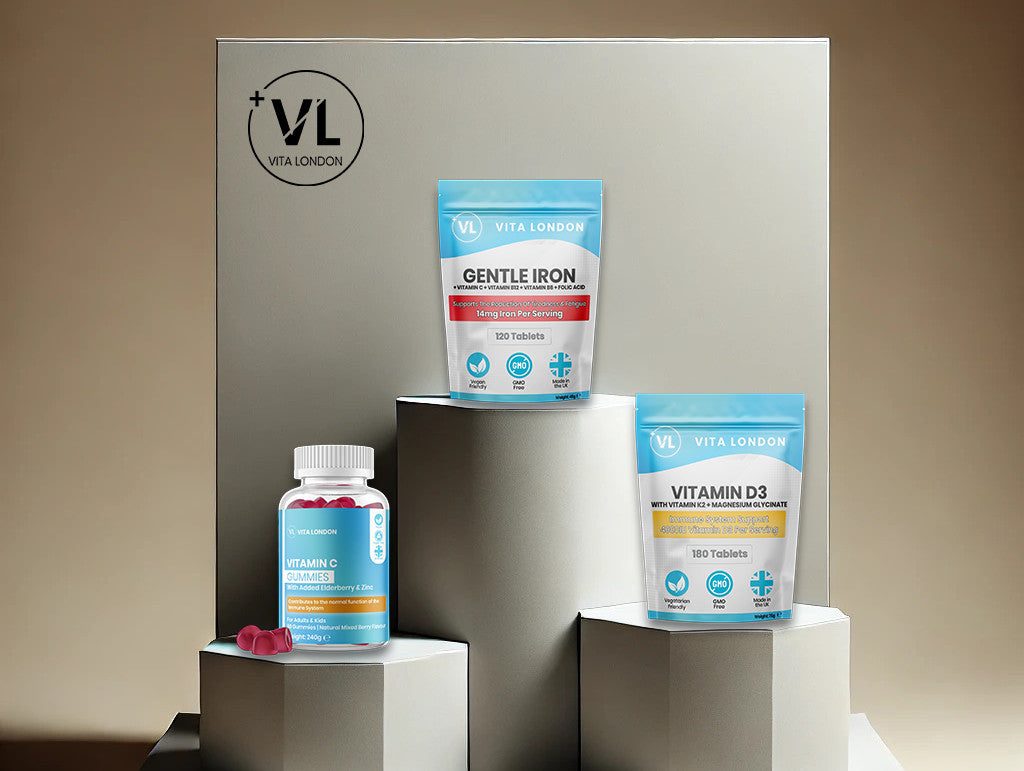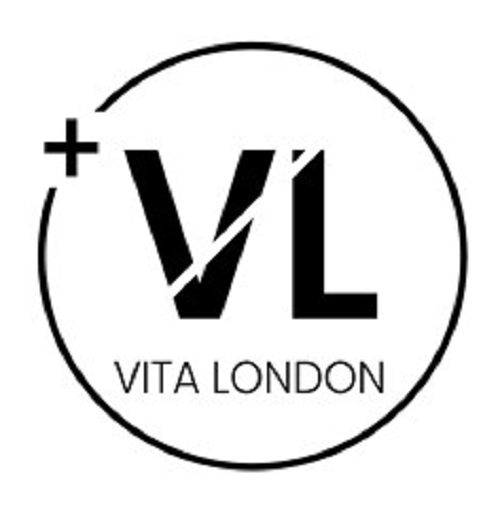
What Vitamins Should Women Take Daily? A Comprehensive Guide
Share
Staying healthy isn’t just about eating well and exercising—it’s also about getting the right vitamins and minerals every day. But with so many options out there, it can be confusing to figure out exactly what your body needs.
This guide breaks it down for you, covering the most important vitamins for women and how they support your health, from energy and immunity to skin, hair, and bone strength. Whether you’re looking to fill nutritional gaps or optimize your wellness routine, here’s what you need to know.
Vitamin D: Bone and Immune Support
Vitamin D is crucial for women’s health, particularly for bone strength and immune function. It helps the body absorb calcium, reducing the risk of osteoporosis, which is more common in women as they age. Studies also suggest that vitamin D supports immune defense and may play a role in mood regulation.
How to Get Enough Vitamin D
- Sunlight: The body produces vitamin D when exposed to sunlight, but this can be difficult in colder months or for those who spend most of their time indoors.
- Foods: Fatty fish (like salmon and mackerel), fortified dairy products, and egg yolks are good dietary sources.
- Supplements: Many women find it helpful to take a vitamin D supplement, especially if they live in areas with limited sunlight.
🔗 Support Your Bone and Immune Health with:
- Vitamin D3 + K2 + Magnesium Glycinate – A powerful combination that enhances calcium absorption and supports overall well-being.
B Vitamins: Energy and Metabolism Boosters
B vitamins play a vital role in energy production, brain function, and metabolism. They help convert food into energy, support red blood cell formation, and keep the nervous system functioning properly.
Some key B vitamins that are particularly important for women include:
- Vitamin B12 – Supports red blood cell production and helps prevent fatigue, especially for those following a vegetarian or vegan diet.
- Vitamin B6 – Plays a role in brain function and mood regulation.
- Biotin (Vitamin B7) – Helps maintain healthy hair, skin, and nails.
How to Get Enough B Vitamins
- Foods: Whole grains, dairy products, eggs, meat, and leafy greens are good sources of B vitamins.
- Supplements: Women who experience low energy or have dietary restrictions may benefit from supplementing with B vitamins.
🔗 Support Your Energy and Hair Health with:
- Iron + Energy Boost Tablets with B12 – Designed to help combat fatigue and support overall energy levels.
- Biotin – A must-have for healthy hair, skin, and nails.
Vitamin C + Zinc: Immunity and Skin Health
Vitamin C and zinc work together to support the immune system, promote healthy skin, and aid in wound healing. Vitamin C is a powerful antioxidant that helps fight free radicals, while zinc plays a crucial role in cell repair and immune defense.
Benefits for Women
- Boosts Immunity – Helps the body fight infections and recover faster.
- Promotes Healthy Skin – Supports collagen production, which keeps skin firm and youthful.
- Supports Wound Healing – Zinc helps the body heal cuts and scrapes more effectively.
How to Get Enough Vitamin C and Zinc
- Foods: Citrus fruits, strawberries, bell peppers, nuts, and seeds are rich in these nutrients.
- Supplements: Taking vitamin C and zinc together can enhance their effectiveness, making it easier to maintain a strong immune system year-round.
🔗 Boost Your Immunity and Skin Health with:
- Vitamin C + Zinc Gummies – A tasty, convenient way to strengthen your immune system.
- Vitamin C + Zinc Tablets – A daily essential for all-around wellness.
Magnesium: Relaxation and Muscle Function
Magnesium is an essential mineral that plays a key role in muscle function, relaxation, and stress management. It helps regulate muscle contractions, supports nerve function, and can even improve sleep quality. Many women are unknowingly deficient in magnesium, which can lead to muscle cramps, fatigue, and trouble sleeping.
Benefits for Women
- Supports Muscle and Nerve Function – Helps prevent cramps and muscle tension.
- Reduces Stress and Promotes Relaxation – Plays a role in calming the nervous system.
- Improves Sleep Quality – Magnesium has been shown to help people fall asleep faster and improve sleep quality.
How to Get Enough Magnesium
- Foods: Leafy greens, nuts, seeds, whole grains, and dark chocolate are great sources.
- Supplements: Many people find magnesium supplements helpful for relaxation and muscle support, especially before bed.
🔗 Support Your Relaxation and Sleep with:
- Magnesium Glycinate Capsules – A highly absorbable form of magnesium to support relaxation and muscle health.
- Magnesium Glycinate Gummies – A delicious and convenient way to maintain healthy magnesium levels.
Iron: Energy and Blood Health
Iron is crucial for producing haemoglobin, the protein in red blood cells that carries oxygen throughout the body. Women, especially those with heavy periods, are more likely to experience iron deficiency, which can lead to fatigue, weakness, and dizziness.
Benefits for Women
- Prevents Fatigue – Low iron levels can cause tiredness and lack of focus.
- Supports Red Blood Cell Production – Essential for transporting oxygen efficiently.
- Important During Pregnancy – Helps support increased blood volume and fetal development.
How to Get Enough Iron
- Foods: Red meat, poultry, beans, spinach, and fortified cereals are good sources.
- Supplements: Women who are prone to low iron levels can benefit from an iron supplement, especially if they follow a plant-based diet or experience heavy periods.
🔗 Support Your Energy and Iron Levels with:
-
Iron + Energy Boost Tablets – A combination of iron and vitamin B12 to help fight fatigue and support energy levels.
Probiotics: Gut and Feminine Health
Probiotics are beneficial bacteria that support digestion, gut health, and immune function. For women, probiotics can also help maintain a healthy balance of vaginal flora, reducing the risk of infections like thrush and UTIs.
Benefits for Women
- Supports Digestive Health – Helps with bloating, regularity, and gut balance.
- Boosts Immune Function – A healthy gut microbiome plays a key role in immunity.
- Promotes Feminine Health – Helps maintain a balanced vaginal microbiome.
How to Get Enough Probiotics
- Foods: Yogurt, kefir, sauerkraut, kimchi, and other fermented foods naturally contain probiotics.
- Supplements: A probiotic supplement can help maintain good gut and feminine health, especially for those with digestive issues or recurrent infections.
🔗 Support Your Gut and Feminine Health with:
- Intimate Flora Probiotics for Women – Specifically designed to support gut health.
- Psyllium Husk with Probiotics – A high-fiber probiotic supplement for gut health and regularity.
Ashwagandha and Adaptogens: Stress and Sleep Support
Ashwagandha is an adaptogen, meaning it helps the body adapt to stress by balancing cortisol levels. It has been shown to support relaxation, improve sleep quality, and boost overall well-being. Many women find it helpful for managing daily stress, reducing anxiety, and even improving hormonal balance.
Benefits for Women
- Reduces Stress and Anxiety – Can help lower cortisol levels and promote a sense of calm.
- Supports Restful Sleep – Helps improve sleep quality and relaxation.
- Balances Hormones – May assist with hormonal fluctuations, including those related to PMS and menopause.
How to Get Enough Ashwagandha
- Foods: Ashwagandha is not commonly found in food but is available as a supplement.
- Supplements: Many women take Ashwagandha as a capsule or gummy to help with stress and sleep support.
🔗 Support Your Stress and Sleep Naturally with:
- Ashwagandha KSM-66 Tablets – A high-potency Ashwagandha supplement to help manage stress and support relaxation.
- Sleep Set Gummies – A complete set to promote deep, restful sleep.
Frequently Asked Questions (FAQ)
To help answer common concerns about daily vitamins for women, here’s a comprehensive FAQ section based on what many people ask when looking for the right supplements.
1. Should all women take the same vitamins?
Not necessarily. While most women benefit from essential vitamins like Vitamin D, B12, and Iron, individual needs vary based on age, lifestyle, and health conditions. For example, pregnant women need more folate, while postmenopausal women often require more calcium and vitamin D.
2. Can I get all my vitamins from food alone?
A well-balanced diet is the best way to get nutrients, but dietary restrictions, busy lifestyles, and poor soil quality can make it difficult to get everything from food alone. Supplements help fill the gaps and ensure you’re meeting your daily needs.
3. How do I know if I need a supplement?
If you often feel tired, have brittle hair/nails, experience frequent illnesses, or struggle with digestion, you might be lacking key nutrients. A doctor can run blood tests to check for deficiencies, but if you suspect gaps in your diet, supplements can help.
4. Can I take multiple supplements together?
Yes, but it’s important to space out certain vitamins to avoid absorption issues. For example, calcium can interfere with iron absorption, so they should be taken at different times of the day. Pairing complementary vitamins, like Vitamin D and K2 or Vitamin C and Iron, can enhance absorption.
5. What’s the best time to take vitamins?
- Morning: B vitamins (for energy), probiotics (for digestion).
- With meals: Fat-soluble vitamins like A, D, E, and K.
- Night: Magnesium and sleep-supporting supplements.
6. Can taking too many vitamins be harmful?
Yes. While most vitamins are safe at recommended doses, fat-soluble vitamins (A, D, E, and K) can build up in the body if taken in excess. Always follow dosage guidelines and consult a healthcare professional if unsure.
7. What vitamins should I take for better skin and hair?
- Biotin and Collagen support hair and nail health.
- Vitamin C boosts collagen production for youthful skin.
- Zinc helps with skin repair and acne prevention.
- Omega-3s (not on this list but useful) support skin hydration and elasticity.
8. What’s the best vitamin for reducing stress and improving sleep?
- Ashwagandha helps regulate cortisol and reduces anxiety.
- Magnesium supports relaxation and sleep quality.
- A blend of natural sleep-supporting ingredients (like in Sleep Set Gummies) can help with falling and staying asleep.
Conclusion
Taking the right vitamins daily can make a huge difference in how you feel, from boosting energy and immunity to supporting skin, hair, digestion, and overall well-being. While a balanced diet is always the foundation of good health, supplements can fill in the gaps where needed.
If you’re looking for high-quality, carefully formulated supplements, Vita London offers a range of premium options designed for women’s health. Whether you need a boost in energy, relaxation, immunity, or gut health, the right supplement can help you feel your best every day.
References
At Vita London, we believe in providing well-researched, reliable information to help you make informed decisions about your health. That’s why we reference trusted sources from leading health institutions, scientific studies, and medical experts. Below, you’ll find links to reputable sources that support the benefits of the vitamins and supplements discussed in this blog.
Vitamin D: Bone and Immune Support
- Vitamin D: Benefits, Sources, Deficiencies – Healthline
- Vitamin D Deficiency: Symptoms, Treatments, and Causes – Healthline
B Vitamins: Energy and Metabolism Boosters
- The Most Effective Vitamins for Boosting Energy – Medical News Today
- Vitamins and Minerals for Energy, Fatigue, and Cognition – PMC
Vitamin C + Zinc: Immunity and Skin Health
Magnesium: Relaxation and Muscle Function
- Everything You Need to Know About Magnesium – Vogue
- From Magnesium for Better Sleep to Zinc to Prevent Hair Loss – The Sun
Iron: Energy and Blood Health
Probiotics: Gut and Feminine Health
Ashwagandha and Adaptogens: Stress and Sleep Support
By linking to these expert sources, we ensure that our recommendations are backed by science and trustworthy research. We encourage our readers to explore these resources and consult healthcare professionals when making health and supplement decisions.






